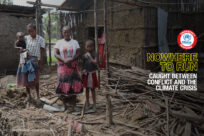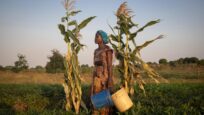UN Human Rights Committee decision on climate change is a wake-up call, according to UNHCR
UNHCR, the UN Refugee Agency, welcomes this week’s ruling of the UN Human Rights Committee in the case of Teitiota v. New Zealand.
While the claim to protection by Mr. Teitiota was denied on grounds that he was not at imminent risk, the committee nonetheless determined that people who flee the effects of climate change and natural disasters should not be returned to their country of origin if essential human rights would be at risk on return.
This is a landmark decision with potentially far-reaching implications for the international protection of displaced people in the context of climate change and disasters. It also underscores the importance of countries taking action to prevent or mitigate against harms associated with climate change, which in future could otherwise force people to leave, triggering international obligations.
The following is a more detailed UNHCR assessment of this ruling:
UNHCR has consistently stressed that people fleeing adverse effects of climate change and the impact of sudden and slow-onset disasters may have valid claims for refugee status under the 1951 Refugee Convention or regional refugee frameworks. This includes but is not limited to situations where climate change and disasters are intertwined with conflict and violence. The Committee’s decision supports this interpretation of existing protection frameworks. It recognises that international refugee law is applicable in the context of climate change and disaster displacement.
Climate change and the impact of disasters resulting from natural hazards can have multiple effects on countries, communities, the well-being of individuals and their ability to enjoy and exercise their rights. This has consequences for the application of the 1951 Convention and regional refugee frameworks such as the OAU Convention and the Cartagena Declaration.
The Committee’s decision elaborates on the specific human rights which may be violated in the context of the adverse effects of climate change and the impact of disasters, including the right to life. The ruling notes that sudden-onset events and slow-onset processes can propel cross-border movement of individuals seeking protection from life-threatening risks.
UNHCR highlights the Committee’s finding that where such risks are imminent, it may be unlawful under the International Covenant on Civil and Political Rights (ICCPR) for governments to send people back to countries where the effect of climate change exposes them to life-threatening risks (article 6) or where they are at real risk of facing cruel, inhuman or degrading treatment (article 7 of ICCPR). The Covenant covers a broad range of civil and political rights that also apply to asylum-seekers and refugees. These include among others the right to life (article 6) and the right not be subjected to torture or to cruel, inhuman or degrading treatment or punishment (article 7).
-

“NOWHERE TO RUN” Climate change and displacement
19 Apr 2024 -

Displaced people join efforts to adapt to climate change in Mozambique
23 Nov 2022With UNHCR’s help, refugees and internally displaced people hit by cyclones are building new homes that can withstand the impacts of climate change.
-

Massive floods in Sudan impact thousands of refugees
6 Oct 2020South Sudanese refugees remain in urgent need of support after heavy rains and floods damage their shelters.
